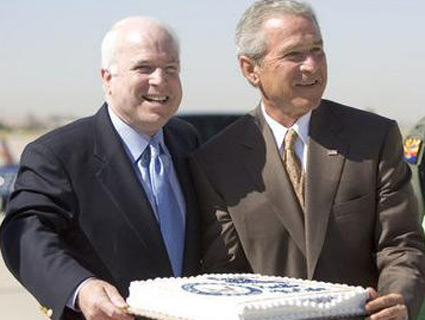At the Washington Post, Greg Sargent takes a look at Sen. John McCain’s (R-Ariz.) previous support of gun control measures, which included ads he cut in October 2000 in support of successful ballot initiatives in Colorado and Oregon to close gun-show loopholes on background checks.
Behind the scenes of Senate Democrats’ efforts to strike a compromise on background checks, McCain is seen as a potential key ally who could make a bipartisan bill more tenable for House Republicans.
“I’m John McCain with some straight talk,” McCain says in the ad. “Convicted felons have been able to buy and sell thousands of guns at gun shows because of a loophole in the law. Many were later used in crimes. That’s wrong.”
So far, Mark Kirk (R-Ill.) is the only Senate Republican to publicly express support for legislation that would require private sellers to run background checks. Along with McCain, senators Susan Collins (R-Maine) and Dean Heller (R-Nev.) are seen as the best bets for a broader bipartisan compromise. Talks between Sen. Chuck Schumer (D-NY), who authored the original background check bill that cleared the Judiciary Committee on a party-line vote, and Sen. Tom Coburn (R-Okla.) fell apart in February. Coburn, however, says he is still open to a limited expansion of the current law.
Sargent points out how McCain’s moderate past on gun control speaks to just how far to the right the debate has since lurched:
What’s particularly interesting here is that McCain was staking out what was then the moderate middle ground. At the time, the left pole of the gun control debate was defined partly by opposition to the idea of a gun ownership right, with some arguing that it only existed on Constitutional grounds in the context of militia membership. McCain’s position put him squarely in the middle between gun control groups and gun rights forces.
Since then, the Supreme Court decision in District of Columbia v. Heller — which struck down D.C.’s handgun ban — upheld a Constitutional right to gun ownership for traditionally lawful purposes. With that Supreme Court precedent set, it should theoretically be even easier for Republicans to accept the middle ground position of universal background checks, which don’t threaten rights that are now enshrined by the Court. But neither McCain nor any other Republican Senator (except for Mark Kirk) has so far proven willing to take the step McCain did back in 2000, underscoring how far to the right the debate remains, even in the wake of the massacre of 20 children.














